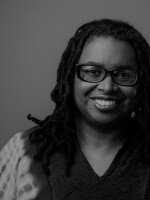According to the Centers for Disease Control and Prevention, black women are three to four times more likely than white women to die from pregnancy-related causes and the rate of infant mortality for black infants is almost double that of white infants. An organization in Kansas City is trying to turn those numbers around.

Kimberly Hardeman is a recent UMKC law school grad. She’s black and pregnant with her fourth child.
Shortly after the vaginal delivery of her second child at a Kansas City hospital in 2010, Hardeman looked down and saw blood. Lots of it.
“I had doctors and nurses, I don’t even know what their role was telling me to calm down, I’m overexaggerating, get myself in control," Hardeman says. "Meanwhile I have needles being stabbed into me. And then I’m told, this is going to hurt. And everybody clinched my limbs and all of a sudden, I had a hand up my vagina and into my uterus and it was unimaginable pain. I was terrified.”
Hardeman says she almost died that day after the doctor failed to remove all the placenta from her uterus. Later, the doctor visited Hardeman with an apology and a waiver of rights to sign. Hardeman says she felt so shaken from the experience, she just signed it.
Hardeman believes her experience happened because she was black. In fact, studies show some medical students and professionals falsely believe black people experience less pain than white people do.
“Childbirth trauma isn’t always related to the pain of childbirth," says Hakima Tafunzi Payne, a founder of Uzazi Village. "It’s actually more often related to how that woman is treated and how she is made to feel in the birth environment."
Payne, a nurse and a mother of nine, says Hardeman’s experience isn’t that unusual for black mothers. Payne helped found Uzazi Village six years ago as a place where black mothers could feel welcome and valued.

Uzazi – which means birth in Swahili - is a modest building near a Rent-A-Center on Troost Avenue. The building is designed to be comfortable, welcoming and nurturing. Uzazi provides breast-feeding consultation and childbirth education, offers clothing and diapers, and has a labor support doula program.
"Is she made to feel as if she is safe and cared for?" Payne asks. "Because if she is, she can endure a lot of pain, but if she isn’t, that’s where the trauma and the suffering begin to come in."
The rate of infant mortality for black infants in Kansas City resembles the national average - almost double that of white infants. Those racial disparities cuts across class. Data shows black college-educated mothers were more likely to suffer severe complications of pregnancy or childbirth than white women who never graduated from high school.
Marion Johnson is a researcher at the Institute for Healthcare Improvement in Boston. Johnson says healthcare providers are no more biased than any other part of the population. But she says studies still show unconscious bias is a significant factor for black mothers.
“The consequences of bias in the provision of health care services may be more serious." Johnson says. "They affect sort of life and death outcomes and very poor birth outcomes in this case."
Johnson’s organization looks to Uzazi as a standard-setter for the work it does, especially its doula program.
Kimberly Hardeman agrees. She used doulas for her last two pregnancies after the earlier trauma giving birth.
"That’s why when I found out about Uzazi, it was so different," Hardeman says. "All of those things – being black, being a woman, being a mom, being a mom of many children – is welcomed. It’s the only place you feel that."
In fact, she felt it so much that Hardeman was inspired to put her legal career on hold to be a doula and is now studying to be a midwife.
Payne says feeling supported and welcomed contributes to a healthy pregnancy and an easier birth experience.
"I’ve had many women – many black women – say to me that they never got congratulated in the course of their whole pregnancy by anyone. But that is very consistent with how I see black pregnant women perceived," Payne says.
Payne is excited about Uzazi being able to offer even more support to black mothers. It plans to open a new clinic this fall, run by midwives and offering hospital and homebirth services for up to 30 women each month.
Michelle Tyrene Johnson is a reporter at KCUR 89.3 and part of the public radio collaborative Sharing America, covering the intersection of race, identity and culture. This initiative, funded by the Corporation for Public Broadcasting, includes reporters in Kansas City, St. Louis, Hartford, Connecticut and Portland, Oregon.


